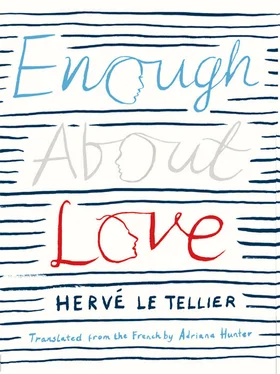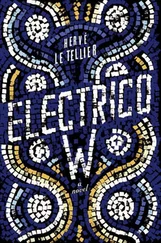“You really are crazy.”
“About you.”
• •
D ESIRE WILL NOT ALLOW for simple explanations. When a cat runs after a mouse, it is not because cat molecules are drawn to mouse molecules. Anna does not understand why her body likes Yves’s hands so much, no more than Yves can explain what drives his hands toward Anna’s body.
Because she allows him to do everything, everything feels natural. Nothing is shameless anymore. Or is it because nothing goes against nature that there is nothing she forbids him? All the same, one evening, after he has taken her way beyond the bounds of convention, she is suddenly worried and whispers: “If you write a book about us one day, don’t talk about that.”
“What do you mean ‘that’?” Yves asks.
“You know what I mean. That.”
Yves shakes his head, kisses her. Why worry, he could never put it into words.
Anna does not like Yves’s desire to be derived from her own. She would sometimes like his passion not to be addressed to her, would like him to take her “as a woman,” “just like that,” so she is reduced to an object in his hands, losing herself in an almost mechanical thirst for sex. She once had a lover—“a bit of a prick,” she admits — who, seeing her naked, said, “A woman is such a beautiful thing,” and that sentence struck her as the most wonderful declaration. Yves, by contrast, finds it utterly predictable, naive, the pronouncement of a truck-driver poet, of a romantic in a wifebeater.
“I don’t give a damn,” she retorts, “I like it. It sets me free.”
Yet when they make love, Yves speaks her name, and the crude and gentle things he says make her head spin: “I love it when you call me Anna. It’s disturbing, like it’s new to me.”
Several times, she asks for a touch of violence. She says: Bite me, hit me. Yves, amused, does as he is asked, finds he knows how to, joins in the game. He quickly reaches his boundaries. He is happy to play along, but with too much pretending, he loses track of himself and of his desire.
After their pleasure, when their bodies refuse to cooperate anymore, the appetite they have for each other is still just as sharp. Anna kisses his neck, Yves fondles her breasts, the back of her neck, her buttocks, amazed by this hunger he cannot satisfy.
“My breasts are getting old,” she grumbles. “You’ve never known them any different, but they were so much better before. Arrogant, that’s the word. They were arrogant.”
He licks her nipples and they harden beneath his tongue, he nibbles them, takes them in his mouth. They are no longer a young girl’s breasts, and that moves him, deeply. Sometimes, appeased, Anna falls asleep, and the soft outline of a smile stays on her lips.
Another time, as she is putting her clothes back on, Yves pushes her down onto the bed again, unceremoniously spreads her thighs and plants a kiss on her pussy. Anna lets him manhandle her, laughing. When Yves stands up, she asks wistfully: “Why can’t I be like I am with you when I’m with Stan?”
She is sincere in her regret, painfully so. It is true, everything would be so much easier. Yves smiles. He has a remarkable capacity for taking these blows on the chin.
Like a teenager, Anna also frequently asks him: “Why do you love me, Yves, why do you love me so much?”
She is not simpering. She wishes the love he felt for her could give her some parameters, convince her she exists, because she exists so fully for him. She would like to feel consistent, as dense and heavy as a clay golem that never questions itself like this. She has such a need for other people. She sometimes says she is just a saprophytic plant, a parasite with a gift for life.
When Anna finally leaves, Yves likes staying in his apartment, making the most of the powerful inertia created by the happiness he feels when he is with her. If he has accepted an invitation for a drink or dinner, he cancels it, claiming he is busy, has a migraine. He wants nothing and no one to obliterate the note he can still hear inside, to disturb the color she has set down in him.
• •
T WO HUNDRED EUROS for a wool sweater, nearly a hundred for a simple black cotton scarf. Yves has hardly ever set foot in such an expensive boutique. Before Anna erupted into his life, he had no dealings with these almost empty places, half art gallery, half salon, where not one dress, not one skirt, not one coat on the racks is a duplicate, where there is often only one size — but one that seems to fit almost all the customers. All the clothes have the supreme elegance to appear not completely new.
“No, it’s not expensive, look, they’re half price,” Anna corrects him, “it’s a sale.”
Clothes are a compulsive passion of Anna’s. She follows fashion closely, knows how to work it, mix trends. Beside her, Yves slightly tarnishes the picture, with his walking shoes and his old duffel coat. She would like to dress him from head to foot, make him “sharp,” elegant. She already influences him: he sometimes wears fine shoes, dark shirts, pants with front pleats. Watching Anna in a boutique, her unselfconscious display of narcissism, amuses Yves far more than it annoys him. He senses that she wants to know just how far he will tolerate this addiction, this fondness for what she calls “an aesthetic” and which she has no intention of losing.
Anna likes being attractive, and does not want to give that up now or later, when age catches up with her. She admires those women who fight every step of the way, and still want to resist the injustices of time in their sixties. She sees nothing ridiculous about wanting to appear twenty years old right to the end. She is vigilant. One lunchtime, when Anna is walking arm in arm with Yves on the rue Oberkampf, they bump into a girlfriend of hers. The woman is still young, very slim, athletic-looking. A sudden ray of sunlight is cruel to her: in its glare, from that angle, the woman’s white skin looks like fragile ancient parchment. Anna shudders. They have barely said goodbye to the woman before Anna rushes into a pharmacy to buy some hydrating cream.
Another day, because she does not have enough time to go up to his apartment and she “doesn’t want to make love in five minutes,” he joins her downstairs, in her car. She suggests they just go for a drink in the café across the street. She takes out her bright red lipstick, eases it onto her lower lip, closes her mouth to spread it, then assesses the result in the rearview mirror. Now enhanced, she looks at him.
“Do you want me to do my eye makeup as well?”
He thinks she looks perfect.
“The actress Romy Schneider always put on makeup when her husband suggested they go out,” she adds, “even just for lunch in the restaurant downstairs.”
Mirrors are important. There are three of them in Yves’s apartment: the big one above the fireplace in the living room, the small one in the bathroom, over the sink, and the last one, a tall full-length mirror, in the bedroom, on the door of a closet. When Anna has to go home, each of them plays its part. First, in the bathroom, she checks the small details, then looks at the bigger picture in the bedroom, and finally proceeds to a general inspection in the living room.
He wonders whether this preoccupation with appearance could come between them one day. Anna’s father is right, though: you fall in love with the flaw. Yves knows this. In his apartment he has a wall light that he commissioned from a sculptor friend, and when it first arrived he was disappointed. He did not dislike it, but it was not what he expected. Now, though, that is partly what he likes about this wall light. It never quite manages to disappear, it is a palpable presence. He does not want a woman who blends in with the background either. Besides, Anna is many things, but not a wall light.
Читать дальше












